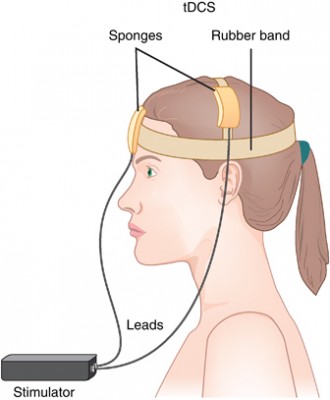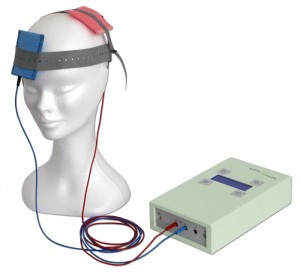TDCS May Improve ADHD Symptoms
 Transcranial direct current stimulation (tDCS) is a therapy in which electrodes placed on the skull deliver a steady, low level current to the brain, changing its threshold for electrical activity. Anodal tDCS to the prefrontal cortex can improve working memory. In a small 2017 study in the Journal of Neural Transmission, Cornelia Soff and colleagues found for the first time that tDCS may improve symptoms of attention-deficit hyperactivity disorder (ADHD).
Transcranial direct current stimulation (tDCS) is a therapy in which electrodes placed on the skull deliver a steady, low level current to the brain, changing its threshold for electrical activity. Anodal tDCS to the prefrontal cortex can improve working memory. In a small 2017 study in the Journal of Neural Transmission, Cornelia Soff and colleagues found for the first time that tDCS may improve symptoms of attention-deficit hyperactivity disorder (ADHD).
People with ADHD tend to have underactivation of the prefrontal cortex and deficits in working memory. The study randomized 15 young people aged 12–16 (three girls and twelve boys) to receive either real tDCS or a sham stimulation. The anodal tDCS was delivered at 1 mA targeting the left dorsolateral prefrontal cortex for 5 days. Those participants who received tDCS showed a reduction in inattention, impulsivity, and hyperactivity compared to those who received the sham stimulation. The effects were more pronounced 7 days after the stimulation, suggesting that tDCS’ effects may be long-term. Larger, more definitive trials are needed to clarify the effects of tDCS on ADHD, but these preliminary findings are promising.
Omega-3 Fatty Acids Improve Attention in Boys
A new study finds that omega-3 fatty acid supplementation improves attention in boys both with and without attention deficit hyperactivity disorder (ADHD). The study by Dienke J. Bos and colleagues in the journal Neuropsychopharmacology included 40 boys (aged 8–14) with ADHD and 39 demographically matched controls. Participants were given 10 g per day of margarine supplemented with either omega-3 fatty acids (eicosapentaenoic acid (EPA) and docosahexaenoic acid (DHA)) or placebo.
The children who received EPA/DHA supplementation showed improvements in attention (as rated by parents) compared to those who received placebo. Improvement was greater in the children with ADHD. Supplementation did not affect cognitive control or brain activity on functional magnetic resonance imaging (fMRI). Those boys who received omega-3s showed higher DHA levels on followup.
Transcranial Direct Current Stimulation May Improve Cognition in Schizophrenia
 A recent study by Robert Smith and colleagues studied the use of transcranial direct current stimulation (tDCS) in patients with schizophrenia. TDCS is very low level current that has a positive (anode) or negative (cathode) electrode. Anodal stimulation of the cortex is usually associated with positive effects on mood and cognition. Patients received either five sessions of active tDCS for 20 minutes (at 2 milli Amps) or a sham stimulation for the same period. Then, one day after the final session, the patients were measured on a variety of scales for cognition and illness. Patients who received the active tDCS showed more improvements in working memory and attention than patients who received the sham treatment.
A recent study by Robert Smith and colleagues studied the use of transcranial direct current stimulation (tDCS) in patients with schizophrenia. TDCS is very low level current that has a positive (anode) or negative (cathode) electrode. Anodal stimulation of the cortex is usually associated with positive effects on mood and cognition. Patients received either five sessions of active tDCS for 20 minutes (at 2 milli Amps) or a sham stimulation for the same period. Then, one day after the final session, the patients were measured on a variety of scales for cognition and illness. Patients who received the active tDCS showed more improvements in working memory and attention than patients who received the sham treatment.
There was no difference in the two groups’ schizophrenic symptoms, including hallucinations. Smith and colleagues suggest that the improvements in cognition may result from changes to brain connectivity networks, since abnormalities in these networks have been identified in patients with schizophrenia and bipolar disorder.
Replications of this type of study are needed to clarify the effect of tDCS on cognition in schizophrenia, but given the safety and convenience of the procedure, the findings are promising.
Malnutrition Early in Life Has Lasting Effects
Severe malnutrition in the first year of life even when corrected for the rest of a person’s life leaves a legacy of permanent cognitive deficits, marked deficits in attention, and increases in depression, conduct disorders, and medical disorders compared to carefully matched controls. Jamina Galler, a researcher at Harvard Medical School, gave a plenary talk at the 2013 meeting of the American Academy of Child and Adolescent Psychiatry on the long-term effects of even short-term childhood malnutrition, including marasmus (calorie deficiency) and kwashiorkor (protein deficiency).
Galler’s studies followed three generations of people born in Barbados and observed the consequences of prior malnutrition, which was completely eliminated in Barbados by 1980. The consequences of malnutrition in the first year of life not only affected the first (G1) generation, but subsequently their offspring in the G2 generation who also suffered an excess of attention-deficit hyperactivity disorder, low IQ, and low annual income into adulthood. That is, the early malnutrition had transgenerational effects.
Malnutrition is a huge problem worldwide and is especially bad in sub-Saharan Africa and some parts of Asia. Globally, malnutrition accounts for 50% of the deaths of children under age five. However, even in the US hunger is a problem for one in four children, or about 16 million individuals, and the long-term consequences of hunger remain to be further studied.
Studies in animals indicate that early malnutrition has epigenetic effects that can be passed on to four future generations before they are reversed. Epigenetic effects refer to environmental factors that cannot change the sequence of DNA, but change how easily it is transcribed by adding or taking away acetyl and methyl groups on DNA and histones, the structures around which DNA is wound. Malnutrition (defined as 6–8% casein, a type of protein, in the diet instead of the normal 25%) in rodents affects cognitive abilities and blood pressure and can lead to diabetes, obesity, and other metabolic abnormalities. The next generation is also affected because a previously malnourished mother huddles too much with her offspring, and they become obese as a result of these poor parenting skills. The second generation also exhibits epigenetic changes in the prefrontal cortex (such as too few glucocorticoid receptors due to methylation of the glucocorticoid promoter) and fewer neurons in the hippocampus.
Editor’s Note: Other data indicate similar long-lasting epigenetic and transgenerational effects of other types of childhood adversity, such as verbal, physical, or sexual abuse. These findings in humans are also paralleled by findings in animals, and give strong credence to the idea that the environment can have long-lasting effects on neurobiology and behavior via epigenetic effects that can be superimposed on whatever genetic effects are inherited.
Data from this editor (Robert Post) and colleagues on verbal abuse in childhood is striking; this supposedly less severe form of abuse is still associated with a more difficult course of bipolar disorder and an increase in medical comorbidities. Thus, the experience of early abuse, even just verbal abuse, appears to have long-lasting consequences for psychiatric and medical health into adulthood.
Adolescent Obesity Connected to Brain Impairment
As childhood obesity has increased over the past several decades, the metabolic syndrome has also become more prevalent among children and adolescents. The metabolic syndrome consists of five measures related to obesity: elevations in fasting glucose levels or insulin resistance, a high proportion of LDL (“bad” cholesterol) to HDL (“good” cholesterol), elevated triglycerides, hypertension, and abdominal obesity or high waist circumference. A patient with three of these abnormalities would be diagnosed with the metabolic syndrome.
In adults, the metabolic syndrome has been associated with neurocognitive impairments. Researchers decided to look at adolescents with the metabolic syndrome to determine whether these brain effects are a result of long-term metabolic impairment or whether they can take place after short-term periods of poor metabolism as well. In a study published by Yau et al. in the journal Pediatrics last year, 49 adolescents with the metabolic syndrome were compared to 62 adolescents without the syndrome who had been matched for similar age, socioeconomic status, school grade, gender, and ethnicity.
The adolescents with the metabolic syndrome had lower scores on tests of math, spelling, attention, and mental flexibility, as well as a trend for lower overall intelligence. In brain measures such as hippocampal volume, amount of brain cerebrospinal fluid, and microstructural integrity in white matter tracts, the seriousness of the metabolic syndrome correlated with the level of abnormality on these measures.
Editor’s Note: It seems as though even short-term problems with metabolism can lead to brain impairments like lower cognitive performance and decreased integrity of brain structures. These effects are even seen before vascular disease and type 2 diabetes are manifest.
It is doubly important, in terms of both cardiovascular and neurobiological risks, to look out for one’s medical and psychiatric health. Reducing the abnormal components of the metabolic syndrome should produce benefits for both the cardiovascular system and the central nervous system.
Almost 40% of patients with bipolar illness in the US have the metabolic syndrome, so considerable effort will be required to improve this public health crisis.
Citicoline May Boost Cognition in Healthy Women
 Citicoline is a natural substance found in the brain and the liver that is also available as a nutritional supplement. At the 51st Annual Meeting of the National Institute of Mental Health’s New Clinical Drug Evaluation Unit in 2011, Erin McGlade and other researchers from the University of Utah Brain Institute presented research showing that citicoline enhanced cognition among healthy women, particularly bringing about improvement in attention. Citicoline has few side effects.
Citicoline is a natural substance found in the brain and the liver that is also available as a nutritional supplement. At the 51st Annual Meeting of the National Institute of Mental Health’s New Clinical Drug Evaluation Unit in 2011, Erin McGlade and other researchers from the University of Utah Brain Institute presented research showing that citicoline enhanced cognition among healthy women, particularly bringing about improvement in attention. Citicoline has few side effects.
The participants in this study were 60 women aged 40 to 60 years who had neither a psychiatric disorder nor any abnormal cognitive decline. The women were divided into groups in which, over the course of a month, they received either 250mg of citicoline, 500mg of citicoline, or a placebo. Both groups who received citicoline performed better on a test of attention at the end of the month than the women who had received placebo.
Editor’s Note: Given that citicoline helps with cognition in healthy women, it may be effective in preventing the cognitive deficits that accompany both the normal aging process and some psychiatric illnesses.




